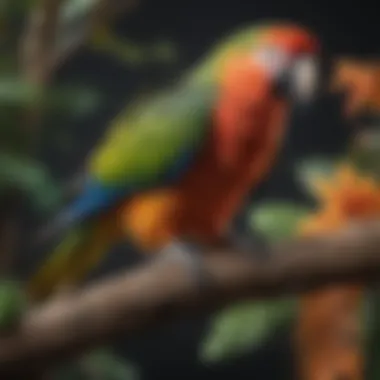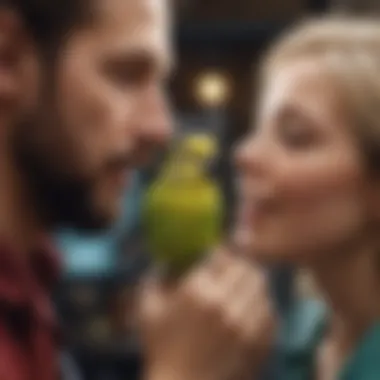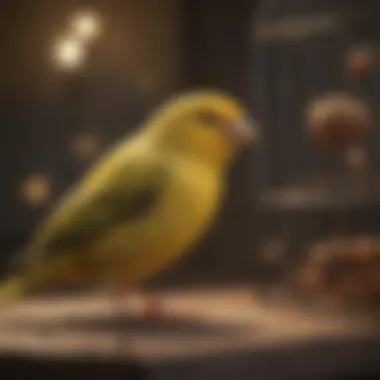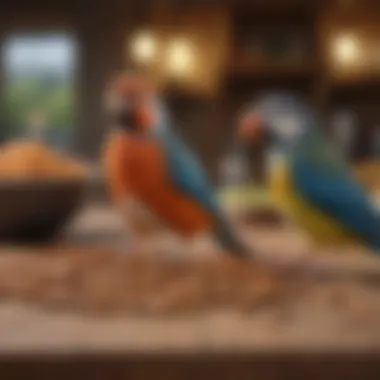Choosing the Perfect Bird Companion for Your Lifestyle


Intro
Choosing the right bird as a pet is a decision that requires careful thought and consideration. Birds can be delightful companions, but they also come with unique needs that differ significantly from those of dogs or cats. Understanding these differences is essential to foster a meaningful relationship. This guide will cover several critical factors, such as care tips, behavioral insights, nutrition guides, wellness, and activities that ensure your pet bird thrives in a home environment.
Birds vary widely in temperament, size, and care requirements, making it crucial to identify which species aligns best with your lifestyle. For instance, some birds thrive on social interaction, while others are more independent. Prospective bird owners need to gather information on various species to make informed choices, ensuring both the pet owner's and the bird's happiness.
In the following sections, we will explore important aspects of bird ownership that include practical care tips and insights into their behavior. Let's begin with care tips that lay the foundation for successful pet ownership.
Foreword to Pet Birds
Birds have become increasingly popular as pets, especially as more people seek companionship that offers unique benefits. Their vibrant colors, diverse sounds, and charming behaviors have caught the attention of many pet enthusiasts. Research indicates that bird ownership can positively influence mental wellness, making them appealing companions.
The decision to welcome a bird into one’s home should not be taken lightly. Understanding the specific needs of different species is essential. Each bird comes with its own set of personality traits, care requirements, and lifespan considerations that should align with the owner’s lifestyle and expectations. Dedicating time to learn about pet birds can profoundly impact the ownership experience.
The Growing Interest in Bird Ownership
Recent trends show a notable rise in pet bird ownership. Factors contributing to this include urban living, where space for traditional pets may be limited. Birds, such as finches or parakeets, require less room and can thrive in smaller environments.
Social media has also played a role in the increase. Engaging videos and photos of birds highlight their charming antics, prompting interest. Many people find comfort in the idea of having a living creature that interacts with them without the heavy demands of other pets.
Moreover, birds offer a way to connect with nature. As urban environments often lack wildlife, owning a bird provides a glimpse into the animal kingdom from within one's home. This connection can be rewarding, allowing owners to witness behaviors that would otherwise be seen only in the wild.
Benefits of Keeping Birds as Pets
Birds come with a variety of advantages. Their small size makes them easy to care for, especially when compared to dogs or cats. On average, they need less space, which is beneficial for apartment living. Here are some key benefits:
- Low Maintenance: While they do require daily attention, birds generally don’t need extensive grooming or outdoor exercise.
- Intelligent Companionship: Many bird species, like African Grey Parrots, are capable of learning tricks and mimicking speech, providing intellectual engagement for their owners.
- Social Interaction: Birds are social creatures. They can bond closely with their owners, often forming a special relationship that can be quite rewarding.
- Educational Opportunities: Owning a bird presents opportunities to learn about avian behavior and biology, making it a fulfilling hobby for those interested in animals.
"Choosing a bird as a pet is about understanding their unique needs and adapting your lifestyle accordingly."
In summary, finding the ideal companion in a bird requires careful consideration of various elements, from the appeal of birds as pets to the specific benefits and responsibilities involved. This foundation sets the stage for deeper exploration into understanding the ideal avian companion.
Key Qualities of an Ideal Pet Bird
The choice of a pet bird involved several key qualities that potential owners should consider. Identifying these qualities helps ensure that both the bird and the owner can lead a happy and fulfilling partnership. Each species exhibits different traits. Understanding these characteristics is crucial for making a suitable choice.
Social Behavior
Birds are inherently social creatures. The social behavior of a pet bird is vital to its well-being. Some species, like budgerigars, thrive on interaction and become unhappy if neglected. This low social interaction can lead to behavioral issues. Other birds, such as African Grey Parrots, are known for their strong bonds with humans. They require ample socialization to remain well-adjusted.
It is essential to consider how a bird interacts not only with humans but also with other birds. Sparrows, for instance, can often be more comfortable in a flock. They might display social behaviors that reflect this inclination towards companionship. Each owner should assess their ability to provide the interaction a bird needs.
Care Requirements
Caring for pet birds entails understanding their specific needs. The various species have different diets and habitat preferences. For example, while a cockatiel may require a varied diet with seeds and fresh produce, a canary might prefer only seeds. Additionally, the size of the cage and environment plays a fundamental role in a bird’s health. Larger breeds need spacious cages, while smaller species can adapt to more compact living spaces.


Regular grooming and hygiene are other critical factors. Birds can be prone to health issues if their living conditions are not kept clean. Owners should allow time for daily cleaning and regular vet check-ups. Understanding these care requirements ensures that the bird remains healthy and happy.
Lifespan Considerations
Lifespan is an important factor to consider. Some bird species live significantly longer than others. For instance, parrot species can live for 20 to 70 years. This long lifespan presents a substantial commitment. Owners must be prepared for a long-term relationship with their bird, ensuring that they can provide continuous care throughout the bird’s life.
In contrast, smaller species such as finches typically have shorter lifespans that range from 5 to 10 years. Potential owners must evaluate their ability to commit for the duration a bird may live.
Noise Level
Noise is a significant consideration when selecting a pet bird. Some birds can be particularly loud, which might disturb the household. For example, Amazon Parrots are known for their loud, boisterous calls, while a budgerigar might be relatively quieter. The noise level can impact the living conditions and comfort of everyone in the home.
It's important for future bird owners to understand their tolerance for noise. Birds that are less noisy may be ideal for individuals living in apartments or smaller spaces.
"Understanding noise levels can make or break your experience with a pet bird."
Choosing the Right Bird Species
Selecting the right bird species is crucial in determining the quality of the relationship between you and your pet. Birds possess distinct traits requiring a focused approach during selection. Recognizing these traits can influence not only the enjoyment of ownership but also the well-being of the bird. A well-suited bird enhances the experience, fulfilling both human and avian needs.
Small Birds: Budgerigars and Canaries
Unique Traits and Temperament
Budgerigars, or budgies, are known for their playful nature and curiosity. They typically exhibit a range of vibrant colors, making them visually appealing. Canaries, on the other hand, are celebrated for their melodic singing. Their temperament varies from shy to bold, allowing them to adapt well to different environments. This adaptability is a vital aspect for potential owners, as it means these birds can thrive in a variety of living situations. Thus, their charm and sociable character are appealing traits for first-time bird owners.
Caring for Small Birds
Caring for small birds like budgies and canaries demands attention to their diet and habitat. These birds usually need a varied diet, encompassing seeds, pellets, and fresh vegetables. Their housing requirements are comparatively simple, with ample space to fly and play. However, neglecting their dietary nuances can lead to health problems. Thus, understanding the specific needs for care helps maintain healthy and happy pets, making those traits essential highlights when choosing a species.
Socialization and Interaction Needs
When it comes to socialization, budgies and canaries thrive on interaction. Budgerigars often form bonds with their owners, seeking companionship and stimulation. Canaries, while less interactive, respond positively to gentle handling. This aspect is crucial because time dedicated to socialization not only improves trust but also mitigates loneliness. Hence, ensuring these small birds' social requirements can significantly enhance their quality of life.
Medium Birds: Cockatiels and Parakeets
Behavior and Interaction Styles
Cockatiels are recognized for their affectionate demeanor. They engage with their owners by whistling and interacting playfully. Their personality tends to be curious and lively, which contributes positively to the atmosphere in a home. Parakeets also present a similar behavior pattern but can vary in their levels of assertiveness. Choosing these medium-sized birds means convivng with their often entertaining behaviors while addressing their social needs encourages strong bonds.
Cage and Environment Requirements
Medium birds typically require spacious cages that allow for movement and exercise. Cockatiels prefer larger cages equipped with various perches and toys. Parakeets benefit from similar setups, but they also require opportunities for out-of-cage time. Not adhering to proper cage standards could lead to health complications or behavioral issues. Therefore, recognizing the importance of their environment leads to successful ownership.
Health Considerations


The health of cockatiels and parakeets needs careful oversight. Regular check-ups with a veterinarian experienced in avian care can avert serious health issues. These birds are susceptible to various diseases, emphasizing the need for preventative health measures. Consequently, understanding their health requirements is critical in sustaining their well-being, making this an indispensable part of the decision-making process.
Large Birds: Amazon Parrots and African Grey Parrots
Intelligence and Social Needs
Amazon and African Grey parrots are known for their remarkable intelligence. These traits render them capable companions. However, their need for mental stimulation is considerable. They often require innovative environments that cahnge regularly, coupled with social interaction to stay content. Owners must dedicate ample time and energy to meet these birds' engaging needs. Neglecting this can result in behavioral problems, underscoring the importance of understanding their intelligence levels.
Long-term Commitment and Care
Large birds generally bring long-term commitments. Amazon parrots can live over 50 years in captivity. This longevity means that potential owners should assess their life circumstances before making a decision. Sufficient planning for their entire lifespan is necessary. Preparing for such long-term responsibilities differentiates casual ownership from dedicated care.
Potential Challenges
Caring for larger bird species comes with unique challenges. Their size necessitates significant living space, and they may exhibit strong personality traits that require careful management. Possible issues like noise levels can affect living situations. Awareness of these potential challenges is vital as it informs owners about what they can reasonably handle.
"Thorough understanding of bird species can significantly enhance human-animal relationships."
In summary, these considerations help prospective bird owners in making well-informed decisions that positively impact both the bird and owner.
Assessing Your Lifestyle Compatibility
Choosing a pet bird involves understanding how well this new companion fits into your life. This section explores the crucial aspects of lifestyle compatibility, ensuring that both you and your bird are happy. Assessing your lifestyle includes evaluating time commitments, living space, and the dynamics of family and other pets.
Time Commitment for Various Species
Different bird species demand varying levels of attention. Parakeets, for example, may be suitable for busy individuals who can allocate a bit of time each day for interaction. In contrast, larger species like African Grey Parrots require significant daily attention. Their intelligence and social nature means they thrive on interaction. These birds can develop behavioral issues if neglected. Time commitment also includes regular maintenance like cage cleaning and providing fresh food.
- Small Birds: Need less time but require social interaction daily.
- Medium Birds: Require moderate attention and can develop strong bonds with their owners.
- Large Birds: Demand extensive time and can become companionable but need careful involvement.
Living Space Evaluation
When thinking about getting a bird, space is a vital element to consider. The size of the bird often influences the amount of space it needs. For instance, a cockatiel can be content in a moderate-sized cage, but it should still have space to stretch and exercise. Larger birds need expansive cages to accommodate their wings and provide necessary enrichment. A cramped environment can lead to stress and health problems.
- Cage Size: Ensure adequate space for the species chosen.
- Flight Area: Consider if there is room for safe flying and exploration outside the cage.
- Minimize hazards: Evaluate the safety of the environment. Avoid toxic plants, and ensure wires and opened window screens are out of reach.
Family and Other Pets Considerations
Integrating a bird into a household with children or other pets requires forethought. Birds can be sensitive to loud noises and fast movements. If children are involved, teaching them how to interact with the bird gently is essential. Supervision will help avoid stress on the bird and potential accidents.
Additionally, around other pets, such as cats or dogs, must be assessed. Some pets may pose a risk to birds. It's imperative to establish safe areas for the bird while ensuring that other pets are not left unsupervised around it.
- Training for Children: Teach respectful interaction.
- Supervision Required: Monitor all interactions between pets and birds.
- Bird and Pet Pairing: Research breed behaviors to ensure harmonized living.
"Compatibility is not only about shared spaces but also shared lives. The right bird for you is one that fits seamlessly into your daily routines, your environment, and your family dynamics."


By carefully considering these elements, you can create a nurturing environment for your bird, ensuring that this new companion enhances your life while being well cared for in return.
Long-term Care and Maintenance
Long-term care and maintenance of pet birds are essential aspects of ensuring their health and happiness. It extends beyond the initial setup and selection process. Sustaining a nurturing environment requires diligence and ongoing effort. This section discusses key components such as nutritional needs, health care, and enrichment activities.
Nutritional Needs
Proper nutrition serves as the foundation of a bird's overall well-being. Different species have unique dietary requirements, and meeting these needs is critical. Birds primarily require a balanced diet consisting of high-quality pellets, fresh fruits, and vegetables. It is also essential to avoid foods that can be toxic.
Providing seeds alone is insufficient for most pet birds, as it may lead to obesity and nutritional imbalances. Vitamins and minerals play a vital role in the diet of pet birds. Learn to recognize signs of malnutrition, such as feather plucking or lethargy, which signal that dietary adjustments may be necessary.
- High-quality pellets should make up approximately 50-70% of a bird's diet.
- Fresh fruits and vegetables should comprise another 20-30%.
- Treats should be limited to no more than 10% of their total food intake.
Monitoring a bird’s weight is also crucial. Regular check-ins ensure they are maintaining a healthy weight and do not face risks associated with obesity.
Health Care and Vet Visits
Routine health care is central to a bird’s long-term maintenance. Regular visits to an avian veterinarian help catch potential health issues before they become critical. Birds are often adept at hiding illness, so periodic check-ups are vital.
Vets should perform a full examination, including blood tests and fecal exams, to assess health status. Vaccinations may be recommended based on the species and living conditions.
Additionally, understanding common health issues that affect pet birds can help owners be proactive. For instance:
- Respiratory illnesses are prevalent in birds kept in dusty environments.
- Feather disorders can arise from poor nutrition or stress.
The Importance of Enrichment Activities
Engaging activities are necessary for the psychological well-being of pet birds. Boredom can lead to behavioral issues such as aggression or self-mutilation. Enrichment helps fulfill their natural instincts and promotes mental stimulation.
Activités may include:
- Toys: Different types of toys stimulate physical and mental exercise. Chewing toys, for instance, can help satisfy the need to gnaw, while puzzle toys stimulate cognitive thinking.
- Social Interaction: Bird-society is a critical aspect of their well-being. Regular interaction with owners or other birds can foster a sense of community and belonging.
- Foraging: Mimicking natural foraging behavior is helpful. Hide treats in different locations, encouraging birds to search for their food.
Providing consistent enrichment can significantly improve a bird’s happiness and reduce the onset of behavioral problems.
Culmination: Making an Informed Decision
The process of selecting the right companion bird is multifaceted and requires careful consideration. The final section of this article emphasizes the importance of making a well-informed choice when it comes to pet birds. This decision extends beyond simply picking a species; it encompasses understanding each bird's distinct characteristics, needs, and how they align with your personal lifestyle.
Weighing All Considerations
When contemplating bird ownership, it is crucial to reflect on various factors that can influence your experience. These factors include:
- Time Commitment: Different species have varied social and care requirements. For instance, some birds thrive on interaction, while others may be more independent.
- Living Space: Assess if your home environment is adequate. Birds like African Grey Parrots may need larger cages and space to move around compared to smaller birds.
- Family Dynamics: Consider how potential bird ownership fits within your family structure. Some birds may require a lot of attention, which may affect your schedule and interactions with family members.
- Long-term Responsibilities: Many birds live for decades. Understand the long-term commitment involved in taking care of your chosen companion.
By weighing these elements, potential bird owners can ensure that they choose a bird that fits seamlessly into their lives rather than disrupt it.
The Joy of Bird Ownership
Owning a bird can bring unique joy and companionship into your life. Birds are known for their engaging behaviors and personalities. They can become integral family members, offering a bond that transcends various forms of pet ownership. The act of caring for a bird promotes responsibility, empathy, and patience. Additionally, observing a bird's capabilities—such as mimicking speech or performing tricks—can offer mental stimulation and amusement, enhancing the joy of ownership.
The relationship between a bird and its owner is often rewarding, allowing for mutual nurturing and companionship. Ultimately, choosing the right bird can lead to a fulfilling partnership that enriches both the bird's and the owner's life. Conclusively, achieving a balance of understanding and commitment is essential to experiencing the true delight of bird ownership.















